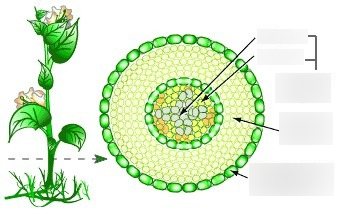plant physio terms
1/73
There's no tags or description
Looks like no tags are added yet.
Name | Mastery | Learn | Test | Matching | Spaced | Call with Kai |
|---|
No analytics yet
Send a link to your students to track their progress
74 Terms
turgor pressure
pressure of water within plant cells, helps hold plants up
plant cell wall
prevents lysis, gives rigidity
primary cell walls
growing cells
secondary cell walls
at maturity secondary cell wall develops and stops growth
physoalexins
chemical compounds synthesized in response to cell wall attack
plastids
important for chloroplasts
an envelope composed of two membranes
primary involved in photosynthesis and storage
vacuoles
big pouch of water in middle of cell
plasmodesmata
pores in the cell wall
primary molecules
found in all cells that are neccesary for life
secondary molecules
present in some plant cells that are imp for plant survival and propagation
alkaloids
organic molecules that contain nitrogen
terpenes
all contain some isoprene, a greenhouse gas released by plants
phenolics
compounds with a hydroxyl group attached
lignin
a phenolic polymer deposited in teh cell wall
sallicylic acid
active ingredient in aspirin, in plants essential for the development of systemic acquired resistance
tannin
stored inside the vacuole to prevent damage to cell
growth
process by which the number and size of cells increases
differentiation
process by which cells with identical genetic consitutions become different from one another
development
maturation into an adult body
meristems
growth points where new tissues are generated through cell division
apical meristems
present at root and shoot tips
secondary meristems
produce secondary tissues
trichomes
hair like cells, can be used as a detterent
dermal tissue
tissue of the plant that makes up the waxy outer layer of the plant
ground tissue
tissue system that makes up the majority of a plant
vascular tissue
Plant tissue consisting of cells joined into tubes that transport water and nutrients throughout the plant body.
sporophyte
Diploid, or spore-producing, phase of an organism
gametophyte
The stage in the life cycle of a plant in which the plant produces gametes, or sex cells. haploid
apoplastic
the space between the cell wall and plasma membrane of a plant cell
allows free movement
symplastic
through cells but not vacuoles
transcellular
water goes through vacuoles
botany
study of plants
autotroph
An organism that makes its own food
chloroplasts
Capture energy from sunlight and use it to produce food for the cell
chlorophyll
A green pigment found in the chloroplasts of plants, algae, and some bacteria
cell wall
A rigid layer of nonliving material that surrounds the cells of plants and some other organisms.
cellulose
Carbohydrate component of plant cell walls.
Phytoalexins
an antibiotic, produced by plants, that destroys microorganisms or inhibits their growth
water potential
the potential energy of a volume of water, expressed as a pressure
parenchyma
Fundamental tissue composed of thin-walled living cells that function in photosynthesis and storage.
Collenchyma
type of ground tissue cell with a strong, flexible cell wall; helps support larger plants
sclerenchyma
type of ground-tissue cell with an extremely thick, rigid cell wall that makes ground tissue tough and strong
nodes
the points at which leaves are attached
internodes
the section of a stem between two nodes
axil
the angle between the upper side of the stem and a leaf, branch, bract, tubercle or petiole
bud
undeveloped leafy offshoots that form on the stem of a plant
epidermis
outermost layer of a plant, acts as protective barrier, regulates water loss, gas exchange
cortex
a tissue that performs many functions, including storage, support, and transportation
located between the epidermis and the vascular tissues
vascular
containing phloem and xylem, type of plant
phloem
Living vascular tissue that carries sugar and organic substances throughout a plant
xylem
vascular tissue that carries water upward from the roots to every part of a plant
sieve elements
living cells that compose sugar-conducting sieve tubes of phloem. Each sieve tube consists of a stack of sieve elements that meet end to end at sieve plates
tracheary elements
specialized dead cells within the xylem tissue that are primarily responsible for transporting water and minerals upwards
pith
ground tissue internal to the vascular tissue
vascular bundle
plant stem structure that contains xylem and phloem tissue
apical meristem
present at root and shoot tips
meristem
Undifferentiated plant tissue from which new cells are formed
determinate growth
stop growing after reaching a certain size
indeterminate growth
growth occurs throughout the plant's life
taproot
Single, large root like a carrot.
fibrous roots
several main roots that each branch off to form a mass of roots
lateral roots
The roots that grow out of the sides of a taproot.
adventitious roots
roots that arise above ground
mucigel
sugary water mixture, protects/lubricates, helps absorption
root cap
a structure that covers the tip of a root, protecting the root from injury
root hairs
increase surface area for absorption
Casparian strip
waterproof strip that surrounds plant endodermis cells
what forces draw water out of a cell
tension draws water up as the molecules stick together
how do roots grow?
By producing new cells at their tips with the root apical meristem
which part of the root does cell division
apical meristem
which part of the root does cell elongation
zone of elongation, just below apical meristem
which part of the root does cell maturation
region of elongation, above apical meristem
dermal tissue (epidermis)
forms the outer layer of a root, shoot, or leaf that covers and protects the plant
